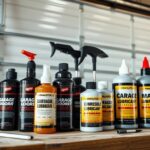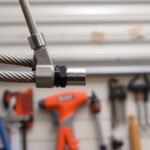Keeping your garage door in good shape is important. It helps it last longer and work better. Knowing how to lubricate it right is a big part of that.
Regular lubrication cuts down on wear and tear. It also stops unexpected noises. This makes sure the door works safely and well.
By taking good care of it, you can save money on repairs. You also get to enjoy your garage door for years to come.
Key Takeaways
- Regular lubrication is key to a long-lasting garage door system.
- Proper care prevents costly repairs down the line.
- Understanding lubrication techniques enhances smooth operation.
- Minimizing wear and tear contributes to safety.
- Noise reduction is a significant benefit of regular maintenance.
Understanding the Importance of Lubricating Garage Doors
Regular maintenance is key for garage doors to last long and work well. Lubricating garage doors is a big part of this. It makes the door mechanisms work better and reduces wear on parts.
Without lubrication, parts can rust, get out of line, or stiffen from friction. Regular oiling helps avoid these problems. It makes the door move smoothly.
Lubrication also cuts down on noise. Doors that slide smoothly make less noise. This makes your home quieter and more comfortable.
It also keeps the door aligned right. This means the door moves as it should without trouble. It makes the door more responsive and safer.
Lastly, regular oiling means you won’t need to fix things as often. This saves money on repair costs. So, keeping your garage door well-lubricated is good for safety and your wallet.
Identifying the Parts of a Garage Door System
Knowing the parts of a garage door system is key for keeping it running well. A garage door has many parts that work together smoothly. Knowing what these parts are helps you know where to apply lubricant and how to make the door work better.
- Garage Door: The main surface panel that opens and closes.
- Tracks: Metal guides that the door moves along.
- Springs: Tension mechanisms that help lift and lower the door.
- Rollers: Small wheels that facilitate smooth movement along the tracks.
- Opener Mechanism: The motor and controls that automate the door’s operation.
Knowing these parts helps keep your garage door working well. Lubricating them right can make each part last longer. This improves how well the whole door works.
When to Lubricate Your Garage Door
Creating a solid garage door maintenance schedule is key for keeping your garage door working well. It’s best to lubricate your garage door every six months. But, if you use it a lot, you might need to do it more often.
After a big storm, lubricating your garage door can help it stay in good shape. This is because storms can make the door’s parts wear out faster.
Seasonal changes can also affect when you should lubricate your garage door. In the winter, metal parts can shrink and expand, causing wear. And in the summer, the heat can do the same thing. So, it’s a good idea to check your door at the start of each season.
Pay attention to any signs that your garage door might need some TLC. If it starts squeaking, jolting, or moving slowly, it’s time to lubricate. Catching these problems early can help avoid bigger issues and keep your garage door running smoothly.
How to Prepare for Garage Door Lubrication
Getting ready is key to keeping your garage door in top shape. First, you need to gather the right tools and safety gear. A good plan helps make the lubrication process smooth and keeps you safe.
Start by making a list of what you’ll need:
- Safety goggles to protect the eyes
- A sturdy ladder for easy access to high areas
- Clean rags for wiping excess lubricant
- Appropriate lubricants, such as silicone spray or lithium grease
Make sure the garage door is closed and not connected to power before you start. This step greatly lowers the chance of accidents. It makes sure you have a safe space to do the lubrication work.
Choosing the Right Lubricants for Garage Doors
Choosing the right lubricants for your garage door is key for smooth operation and long life. There are many types of lubricants out there, each with its own benefits and uses. Knowing about these options helps you make the best choice.
One top choice is silicone spray. It’s clean to apply and doesn’t leave a lot of residue. It works well on metal and plastic parts. Plus, it keeps dirt and moisture away, protecting your door for a long time.
White lithium grease is also great. It’s thick and sticks to surfaces, perfect for parts that get a lot of wear, like hinges and rollers. This grease helps get rid of squeaks and keeps everything moving smoothly.
Penetrating oils, like WD-40, are perfect for loosening stuck parts. They get deep into the components, making them great for initial maintenance or tough parts.
Brands like DuPont and CRC make reliable products for garage doors. By carefully looking at each product’s features, you can find the best one for your needs.
How lubricate garage door
Learning how to lubricate a garage door is key to keeping it working well. It helps extend its life. By following the right steps, you ensure everything moves smoothly. This guide will show you how to do it right.
Step-by-Step Guide to Lubricating Your Garage Door
- Clean the Exterior: Start by cleaning the garage door with a damp cloth. This removes dust and gets it ready for lubrication.
- Inspect for Damage: Look over the door and its parts for any wear or damage. Fix any problems before you start.
- Apply Lubricant: Choose a good lubricant like lithium grease or silicone spray. Spray it on moving parts like hinges, rollers, and tracks.
- Distribute Evenly: Use a clean cloth or brush to spread the lubricant evenly. This makes sure everything is well-covered.
- Test Functionality: Open and close the door a few times. This checks if the lubricant is working and the door moves smoothly.
Adding these steps to your regular maintenance routine can make your garage door last longer. A well-kept garage door works better and keeps your home safe and convenient.

How to Lubricate a Garage Door Track
Lubricating garage door tracks is key for smooth operation and longer life. Knowing how to do it right can save you time and money. Here are the tools and techniques you need for the best results.
Tools Needed for Track Lubrication
- Brush for cleaning
- Synthetic lubricant for garage doors
- Soft cloths for wiping
- Vacuum for debris removal
Applying Lubricant Effectively on Tracks
Make sure the tracks are clean before you start. Clean tracks help the lubricant work better. Here are some tips for lubricating tracks:
- Use a brush to remove grime from the tracks.
- Vacuum loose debris to avoid blockages.
- Spread the synthetic lubricant evenly along the track.
- Use a soft cloth to wipe off any extra lubricant and prevent dirt buildup.
How to Lube Garage Door Springs
Garage door springs are key to the door’s function, helping lift and lower it. Learning how to lube them right can make them work better and last longer. Regular care keeps the door moving smoothly and cuts down on wear.
Before you start, safety is a top priority because the springs are under a lot of tension. Always wear gloves and safety goggles to protect yourself. Make sure to disconnect the garage door opener first.
Choosing the right lubricant is critical. Stay away from motor oil or grease, as they can attract dirt. Instead, use a light, silicone-based lubricant made for garage door springs. It won’t hold dirt and protects well.
To lube garage door springs right, follow these steps:
- Apply lubricant evenly along the length of each spring.
- Use a cloth to wipe away excess lubricant to prevent buildup.
- Manually operate the garage door a few times to distribute the lubricant evenly.
Adding this simple step to your regular maintenance can stop problems before they start. It also helps your garage door springs last longer.

How to Oil Garage Door Chain
Keeping your garage door chain well-maintained is key to smooth operation and a longer-lasting system. Knowing how to oil your garage door chain right can prevent wear and tear. This reduces the chance of breakdowns. It’s all about using the right oil and applying it correctly for efficient chain operation.
Types of Oil Best Suited for Chains
Choosing the right oil for your garage door chain is important. Here are some top options:
- Chain oil – Made for chains, it reduces friction well.
- Lightweight motor oil – A good all-around lubricant for chains.
- Synthetic oils – They offer better lubrication and protection than regular oils.
Applying Oil to the Garage Door Chain
Here’s how to apply oil correctly:
- Clean the chain with a rag to get rid of dirt and debris.
- Choose your lubricant and get ready to apply it. A spray nozzle or small container helps with precision.
- Start oiling at one end of the chain, letting the oil spread evenly.
- Move the door up and down a few times to spread the oil well.
- Wipe off any extra oil to avoid attracting dust and dirt.
Knowing how to oil your garage door chain and choosing the right products makes maintenance easy. Regular lubrication keeps your garage door running smoothly and extends its life.
| Type of Oil | Benefits | Best Use Cases |
|---|---|---|
| Chain Oil | Reduces friction, penetrates easily | Ideal for regular use on chains |
| Lightweight Motor Oil | Versatile, effective lubrication | Used for various garage door components |
| Synthetic Oil | Superior lubrication, long-lasting | Optimal for high-performance needs |
Common Mistakes to Avoid When Lubricating a Garage Door
When you maintain your garage door, knowing the common mistakes is key. Over-lubricating can attract dirt and grime. This can make the door work poorly over time.
Choosing the wrong lubricant is another big mistake. Not all lubricants are right for every part. Always check what the manufacturer recommends.
Not cleaning the surfaces before lubricating is also a mistake. Cleaning removes dust and debris. This makes the lubricant work better and helps the door move smoothly.
To help you avoid these mistakes, here’s a list:
- Don’t over-lubricate; a little is enough.
- Don’t use general-purpose lubricants on garage doors.
- Clean surfaces before applying lubricant.
- Follow the manufacturer’s lubrication schedule and guidelines.
- Don’t ignore wear and tear; it might need repairs.

| Common Mistakes | Consequences | Solutions |
|---|---|---|
| Over-lubricating | Attracts dirt, causing wear | Use moderation when lubricating |
| Wrong type of lubricant | Damage to components | Consult manufacturer recommendations |
| Neglecting to clean | Reduced effectiveness | Clean all surfaces before lubrication |
| Not following maintenance schedule | Decreased door lifespan | Establish a regular lubrication routine |
| Ignoring inspection for repairs | Potential safety hazards | Regular visual checks for wear |
Knowing these common mistakes helps you avoid problems. This ensures your garage door lasts longer and works better.
Maintaining a Regular Garage Door Lubrication Schedule
Creating a garage door lubrication schedule is key to keeping your garage door working well. Regular care stops wear and tear, keeping your door in top shape. Homeowners can make a maintenance calendar that takes into account seasonal changes and how often they use it.
To make a good lubrication schedule, follow these steps:
- Find out when you use your garage door the most, like in winter when it gets stiff.
- Set reminders for when to lubricate, aiming for every six months as a rule.
- Watch how your garage door works; odd noises or trouble opening means it needs oil.
- Change the schedule if you use your garage door more; busy homes need more care.
Sticking to a well-thought-out garage door lubrication schedule helps your doors run smoothly. This saves money on repairs down the line.
Signs Your Garage Door Needs Lubrication
Knowing when your garage door needs lubrication can stop bigger problems later. Look out for these common signs:
- Unusual noises: Squeaks or grinds mean it’s time for some oil.
- Difficulty in opening or closing: If it’s hard to move, it might need some grease.
- Visible rust: Rust is a clear sign of no lubrication, which can damage more if ignored.
Not taking care of these signs can cause more damage. It might even break your garage door. So, it’s important to act fast when you see these indicators of lubrication requirement.
| Signs | Consequences of Neglect |
|---|---|
| Unusual noises | Indication of worn-out components that may fail. |
| Difficulty in operation | Increased stress on the motor and possible electrical problems. |
| Visible rust | Corrosion that could lead to expensive repairs and replacements. |
Conclusion
Regular maintenance is key to keeping garage doors working well. It makes them run smoothly and safely. By doing this, homeowners can avoid big problems with their doors.
This article has shown how important maintenance is. It’s not just about following steps. It’s also about the benefits it brings. Using the right lubricants can make your garage door last longer and save you money on repairs.
So, it’s important to make maintenance a regular part of your routine. This way, your garage door will stay in good shape for a long time. It shows how important garage door care is for your home.





